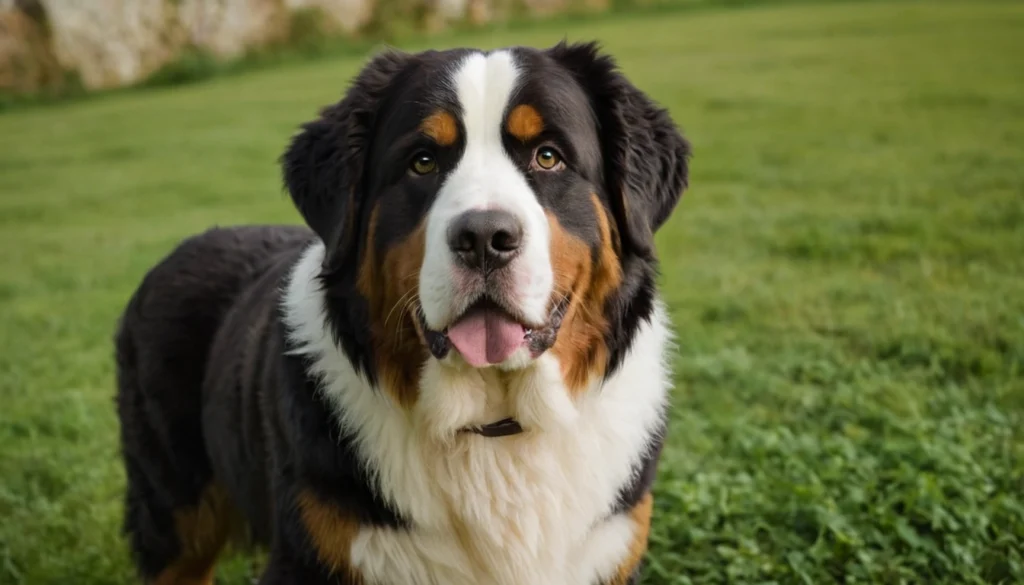In this article, we will explore everything about the Bernese Mountain Dog, from its history, types, and temperament to its health, lifespan, and costs in different countries, including India. We’ll also address common FAQs and provide useful tips on grooming, diet, and care.
The Bernese Mountain, commonly referred to as the Berner, is a large and affectionate dog known for its incredible loyalty, friendly temperament, and striking appearance. Originally bred in the Swiss Alps, this working breed is well-known for its ability to pull carts, herd cattle, and protect livestock. Over the years, the Bernese Mountain has grown in popularity worldwide, not only as a working dog but also as a beloved family companion. Their gentle nature, combined with their impressive strength, makes them a perfect fit for many households.
- Origin of the Bernese Mountain Dog
- Physical Characteristics and Appearance
- Types of Bernese Mountain
- Temperament and Behavior
- Training and Socialization
- Health and Lifespan of the Bernese Mountain Dog
- Bernese Mountain Dog Price Around the World
- Price of Bernese Mountain in India
- Caring for a Bernese Mountain
- Grooming Requirements
- Diet and Nutrition
- Exercise Needs
- FAQs
The Bernese Mountain is one of the most endearing and beautiful breeds you can bring into your home. Known for their tricolor coats—a stunning mix of black, white, and rust—these dogs are more than just a pretty face. They are loyal companions, hardworking dogs, and gentle giants, often described as being perfect for families due to their friendly and patient temperament.
However, owning a Bernese Mountain Dog comes with a lot of responsibilities. They are large dogs with significant grooming, exercise, and health care needs. In this guide, we aim to cover every aspect of the Bernese Mountain Dog to help you understand what it takes to care for this magnificent breed.
Origin of the Bernese Mountain

The Bernese Mountain traces its roots back more than 2,000 years to the Roman times. The breed was initially developed in the Swiss Alps, where it played a crucial role on farms and ranches. These dogs were mainly used to pull carts loaded with goods, herd livestock, and serve as guard dogs.
One of four types of Swiss Mountain Dogs, the Bernese Mountain is the only one that has long fur. It takes its name from the canton of Bern in Switzerland, where it was originally bred.
The breed gained recognition beyond Switzerland when it was introduced to the United States in the early 20th century, and it has since become a popular breed around the globe, admired for its versatility, loyalty, and warm demeanor.
Physical Characteristics and Appearance
One of the first things that stands out about the Bernese Mountain is its stunning appearance. These dogs are large, muscular, and covered in a striking tricolor coat. Here’s a closer look at their key physical traits:
- Size: Males typically stand 25-28 inches tall at the shoulder and weigh between 85-115 pounds, while females are slightly smaller, measuring 23-26 inches and weighing 70-95 pounds.
- Coat: Their coat is thick and double-layered, providing excellent insulation in colder climates. The outer layer is long and wavy, while the undercoat is softer and denser.
- Color: The breed standard calls for a jet-black coat with rust-colored markings over the eyes, on the sides of the mouth, front of the legs, and chest. The chest also has a white marking known as the “Swiss cross.”
- Build: The Bernese Mountain is strong and sturdy, with a broad chest, muscular legs, and a robust build that enables them to carry out demanding tasks such as cart-pulling and herding.
Types of Bernese Mountain Dogs

Though there is only one officially recognized Bernese Mountain Dog breed, there are some variations in size, temperament, and purpose depending on the lineage. Bernese Mountain Dogs bred for show may differ slightly from those bred for working purposes or companionship.
- Working Line Bernese Mountain: These dogs are bred for endurance, strength, and functionality. They tend to be larger and stronger, as they are primarily used for labor-intensive work such as pulling carts or herding cattle.
- Show Line Bernese Mountain: These dogs are bred with appearance in mind, and they typically have a more refined, symmetrical look. They may be slightly smaller than their working-line counterparts but are still robust and capable.
- Companion Bernese Mountain: These dogs are bred primarily for companionship and family life. They often have more gentle temperaments, making them ideal family pets.
While there are no formal sub-breeds or types of Bernese Mountain, the lineage and purpose of a dog’s breeding can influence its appearance and temperament.
Temperament and Behavior
The Bernese Mountain is famous for its friendly, calm, and affectionate nature. These dogs are incredibly loyal and often form strong bonds with their families. Despite their large size, Berners are known for being gentle, making them excellent companions for families with children.
- Loyal and Devoted: Bernese Mountain are fiercely loyal and tend to follow their owners from room to room. They are affectionate and love to be involved in family activities.
- Great with Children: Berners are known for their patience and gentleness, particularly around children. Their calm demeanor makes them less likely to react aggressively, although their size can sometimes be overwhelming for very small children.
- Sociable: Though they may be a little reserved with strangers at first, Bernese Mountain Dogs are generally friendly and open to meeting new people.
- Protective Instincts: While not aggressive, Berners are known for being protective of their families and will often alert their owners to strangers or potential threats.
- Temperament: Their temperament is calm and balanced, making them good choices for both family life and working roles.
Training and Socialization
Training a Bernese Mountain Dog should begin early, as their large size can make managing them more challenging if they are not properly trained. They are intelligent dogs, which means they can pick up commands and behaviors quickly, but they also have a somewhat independent streak.
- Start Early: Begin obedience training while your dog is still a puppy to prevent unwanted behaviors from developing.
- Positive Reinforcement: Bernese Mountain respond best to positive reinforcement methods such as praise, treats, and play. Avoid harsh punishment, as they can be sensitive to negative treatment.
- Socialization: Early socialization is key to ensuring your Bernese Mountain Dog is comfortable around other people, animals, and environments. Exposure to a variety of sights, sounds, and experiences will help prevent fear or anxiety later in life.
Health and Lifespan of the Bernese Mountain

While Bernese Mountain known for their loving and gentle personalities, they are unfortunately prone to several health issues. The breed’s relatively short lifespan is often attributed to these health problems.
Common Health Concerns
- Hip and Elbow Dysplasia: Large breeds like Berners are prone to joint problems. Hip dysplasia occurs when the hip joint doesn’t fit together properly, while elbow dysplasia affects the elbow joint. Both conditions can cause arthritis and mobility issues.
- Bloat (Gastric Dilatation-Volvulus): A life-threatening condition where the stomach twists and traps gas, leading to pressure on other organs. Immediate veterinary intervention is necessary if this occurs.
- Cancer: Sadly, the Bernese Mountain has a high incidence of cancer, particularly histocytic sarcoma, which can significantly impact their lifespan.
- Progressive Retinal Atrophy (PRA): A genetic condition that causes gradual vision loss due to the degeneration of the retina.
Lifespan
On average, Bernese Mountain Dogs live between 7 and 10 years, although some can live longer with good care and management of health conditions. Regular vet check-ups, a balanced diet, and appropriate exercise can help to extend their lifespan.
Bernese Mountain Dog Price Around the World
The price of a Bernese Mountain Dog varies significantly depending on the country, breeder reputation, bloodline, and availability. Here’s a breakdown of the costs in different countries:
United States
- Price Range: $1,200 – $4,000
- Factors: Dogs from reputable breeders with health guarantees and champion bloodlines can command prices on the higher end of this scale.
United Kingdom
- Price Range: £800 – £2,500
- Factors: Prices depend on whether the dog is bred for companionship or show. Dogs with Kennel Club registrations tend to be more expensive.
India
- Price Range: ₹45,000 – ₹150,000
- Factors: In India, the price depends on the breeder’s reputation, the dog’s lineage, and whether the dog is imported. Bernese Mountain Dogs are relatively rare in India, which can drive up prices in major cities like Delhi, Mumbai, and Bangalore. Imported Bernese Mountain Dogs or those from champion bloodlines may cost significantly more, especially when factoring in transportation and import fees.
Australia
- Price Range: AUD 2,500 – AUD 6,000
- Factors: In Australia, the price is determined by the dog’s lineage, breeder reputation, and the presence of health certifications. Show-quality dogs tend to be more expensive than those bred for companionship.
Canada
- Price Range: CAD 1,500 – CAD 4,500
- Factors: Similar to the U.S., the price of a Bernese Mountain in Canada depends on the breeder’s reputation, location, and whether the dog comes from a line with health clearances or show potential.
Price of Bernese Mountain Dog in India
As mentioned above, the cost of a Bernese Mountain Dog in India can vary greatly depending on the city and breeder. Typically, puppies in India can be found between ₹45,000 and ₹150,000. However, imported dogs or those with pure champion bloodlines can cost more. Factors that affect the price in India include:
- Location: Prices tend to be higher in larger metropolitan areas like Mumbai, Delhi, and Bangalore.
- Breeder Reputation: Well-established breeders who follow ethical practices, such as providing health certificates and ensuring proper care, tend to charge more.
- Lineage: Dogs with show-quality bloodlines or imported parents will generally be more expensive.
Caring for a Bernese Mountain Dog
Caring for a Bernese Mountain Dog involves meeting their basic needs for grooming, exercise, and proper nutrition. Since these dogs are large and have a thick double coat, they need regular maintenance to stay healthy and comfortable.
Grooming Requirements
The Bernese Mountain Dog’s beautiful coat requires consistent care to keep it looking healthy and to prevent matting. Here are the key grooming needs for this breed:
- Brushing: Berners have a thick double coat that sheds heavily, particularly during shedding seasons (spring and fall). They require regular brushing at least 2-3 times per week to remove loose fur and prevent mats from forming. During shedding periods, daily brushing may be necessary.
- Bathing: Berners don’t require frequent baths, but it’s recommended to bathe them every couple of months or when they become dirty. Always use a dog-specific shampoo to maintain the natural oils in their coat.
- Ear Cleaning: Due to their floppy ears, Bernese Mountain Dogs are prone to ear infections. Clean their ears weekly to prevent the buildup of wax and debris.
- Nail Trimming: Their nails should be trimmed regularly, ideally every 3-4 weeks. Long nails can cause discomfort and potential health issues.
- Dental Care: Dental hygiene is crucial. Brush your dog’s teeth several times a week to prevent tartar buildup and gum disease.
Diet and Nutrition
A balanced diet is essential for keeping your Bernese Mountain Dog healthy and supporting their large frame. Given their size and potential for health issues like obesity and bloat, their diet should be carefully managed.
- High-Quality Food: Feed your Bernese Mountain Dog a diet consisting of high-quality kibble or a balanced raw food diet. Ensure the food is appropriate for large-breed dogs and includes enough protein to support their muscle development.
- Meal Frequency: To reduce the risk of bloat, feed your Bernese Mountain Dog 2-3 smaller meals per day rather than one large meal. Avoid exercising them immediately after eating.
- Supplements: Some Berners may benefit from joint supplements, especially if they are prone to hip or elbow dysplasia. Always consult your vet before introducing supplements to their diet.
- Water: Fresh water should always be available to keep your dog hydrated.
Exercise Needs
Bernese Mountain Dogs are active dogs that need regular exercise to keep them physically and mentally stimulated. Although they are calm and gentle indoors, they still need outdoor activity to prevent boredom and weight gain.
- Daily Walks: Berners need at least 30-60 minutes of exercise daily, which can be broken up into a couple of walks or outdoor play sessions.
- Hiking: Given their mountain-dog heritage, Berners love to hike and enjoy outdoor activities such as long walks in nature.
- Playtime: In addition to walks, these dogs enjoy playtime with their families. Fetch, tug-of-war, or agility training can help burn off energy and keep them engaged.
FAQs
1. Are Bernese Mountain good with children?
Yes, Bernese Mountain known for their gentle and patient nature, making them excellent companions for families with children. Their size may be intimidating to smaller kids, so supervision is recommended to prevent accidental injuries.
2. How much does a Bernese Mountain shed?
Berners are heavy shedders, particularly during shedding seasons in the spring and fall. Regular brushing will help control shedding, but expect to see a lot of fur around the house.
3. What is the lifespan of a Bernese Mountain?
The average lifespan of a Bernese Mountain is 7-10 years. Some dogs may live longer with proper care, but unfortunately, the breed is prone to health issues that can affect their longevity.
4. Are Bernese Mountain Dogs easy to train?
Bernese Mountain Dogs are intelligent and eager to please, which can make training relatively easy. However, they can be a bit independent, so consistent training with positive reinforcement from an early age is essential.
5. How much does a Bernese Mountain cost?
The price of a Bernese Mountain can vary significantly depending on the country, breeder, and bloodline. In India, they generally range from ₹45,000 to ₹150,000. Prices in other countries, such as the U.S. or U.K., can vary from $1,200 to $4,000 or £800 to £2,500, respectively.
6. Do Bernese Mountains have health problems?
Yes, Bernese Mountains are prone to several health issues, including hip dysplasia, elbow dysplasia, bloat, and cancer (particularly histiocytic sarcoma). Regular vet check-ups and a healthy lifestyle can help manage and prevent some of these conditions.
7. How much exercise do Bernese Mountain need?
Berners need at least 30-60 minutes of daily exercise. While they are not hyperactive dogs, they enjoy outdoor activities such as hiking, walking, and playing, which help keep them healthy and prevent obesity.
8. Can Bernese Mountain live in hot climates?
Due to their thick double coat, Bernese Mountains are more suited to cooler climates. In hot climates, they need to be kept indoors during the hottest parts of the day, and access to plenty of water and shade is crucial to prevent overheating.
The Bernese Mountain Dog is a loving, loyal, and hardworking breed that makes an excellent companion for the right family. Their stunning appearance, affectionate nature, and strong work ethic make them a versatile dog, whether as a family pet or a working dog. However, prospective owners must be prepared for the grooming, training, and health care requirements that come with this breed.
If you’re looking for a gentle giant that will provide your family with love and protection, the Bernese Mountain may be the perfect addition to your home. Just ensure you have the time, space, and resources to meet their needs, including regular grooming and sufficient exercise.
Ready to learn more about dog breeds and pet care? Check out our other detailed guides, such as “Top 5 Dog Breeds for Adoption” or “Best Budget-Friendly Dog Foods”, to further enhance your knowledge of canine companions.

